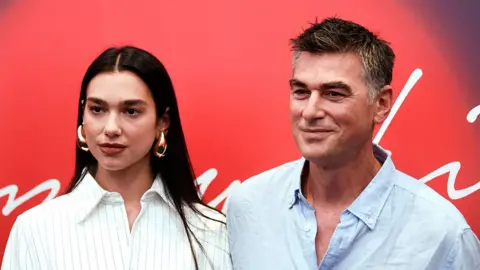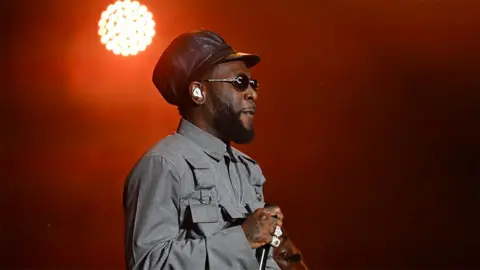The Dua Lipa festival aiming to change Kosovo’s image
 Getty Images
Getty ImagesAcross the summer in the UK there’s a music festival pretty much every week somewhere in the country.
Highlights include the summer kick off with Radio 1’s Big Weekend in May, Glastonbury’s dominance in June, Latitude in July and a Reading and Leeds Bank Holiday bonanza in August.
Some could argue British music lovers are spoilt for choice.
In some parts of the world there’s no option to dance with your mates in a field while holding a lukewarm beer, getting to grips with dry shampoo, shoddy phone signal and chants of ‘Oggy, oggy, oggy, oi, oi, oi’.
That’s where Dua Lipa and her dad Dukagjin wanted to change things by launching Sunny Hill festival in the family’s home city of Pristina, Kosovo – a part of the world few international artists toured.
“I want to change the rhetoric of what people think about Kosovo and it being war-torn,” Dua explained earlier this year.
“When I was living in Kosovo, none of the artists I wanted to see ever came down.”
 Getty Images
Getty ImagesDua was born in the UK but moved to Pristina as a child after a war in the late 1990s left more than 10,000 dead, as Kosovo fought for independence from Serbia.
It declared it in 2008, although some countries – including Serbia – refuse to recognise it.
“Reinstating the country took more years than we’d liked,” Dukagjin says.
He says it was “always a dream” to have something like Sunny Hill in Pristina, after working in the live music events industry for years before Dua made it as an international pop star.
In 2018, 10 years after Kosovo declared independence, Sunny Hill launched – headlined by Dua as tens of thousands celebrated one of their own making the big time.
But it was harder then to convince other global artists to play. The following year though, friends of the New Rules star Miley Cyrus and Calvin Harris agreed to top the bill, the first time they performed in the region.
That changed how the festival was seen by other acts and their management teams.
“We really do punch way above our weight when it comes to the line-up,” Dukagjin tells BBC News.
“When I talk to the artists about coming I say: ‘Look you might not have the tequila you want on your rider, but trust me you’ll have the best sound equipment money can buy’.”
 Getty Images
Getty ImagesHis latest data estimates that about 40% of visitors were from outside Kosovo – noting that will be strongly influenced by the country’s diaspora as those with family connections here bring friends with them.
Some had travelled as far from Chicago in the US to see artists like Bebe Rexha, Burna Boy, Stormzy, and DJ Snake headline the main stage last weekend.
Groove Armada, Black Coffee and Griff were all also on the bill.
Kosovo is thought to have Europe’s youngest population as more than half are estimated to be under the age of 30.
Travel restrictions, until earlier this year, meant local musicians didn’t have the flexibility to play in other parts of the continent.
“It’s not that easy to be a musician,” explains singer La Fazani, who’s played Sunny Hill multiple times.
“The only way you can actually make good income is by playing nightclubs.”
He recently won a big TV show in the country but says without Sunny Hill he wouldn’t get to play live to a crowd of thousands, and hopes the Lipa guest list could improve his career.
“Sunny Hill is one of the greatest generators of a positive image of Kosovo,” he says.
“There’s many international label people here and I hope I might have caught the eye of someone who might like what I do.”
Allow Instagram content?
and
before accepting. To view this content choose ‘accept and continue’.
Fresh from seeing his daughter headline one of the biggest festivals in the world, Dukagjin says “Glastonbury is one of a kind” and knows it will be hard for his project Sunny Hill, which took place for the first time on its new permanent site to accommodate the growing audience, to reach a status like that.
Although, he says industry friends like Coachella owner Paul Tollett say the project reminds him of Glastonbury in the 1980s, and there are plans to make it more than a live music festival.
“I love artists who spend a day or two longer in Pristina and have a chance to meet local artists and share ideas.
“And for them to rub shoulders with people in the music industry, and hopefully next year we can create a movement with some workshops,” Dukagjin says.
You can learn more about Sunny Hill Festival and how Kosovo is trying to change its image on Business Daily.








